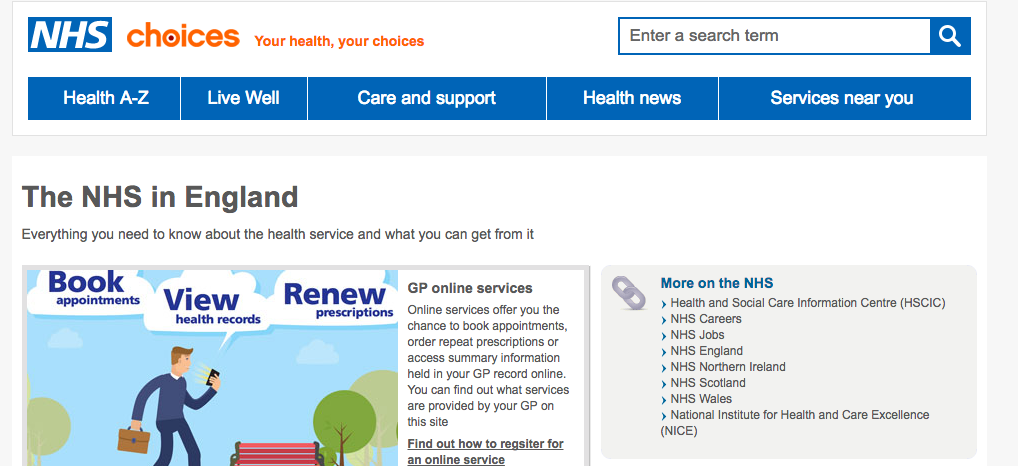Moving to London can be overwhelming.
With 8.5 million residents and counting, London is one of the world’s largest and most economically powerful cities. Every year hundreds of thousands of individuals, families and couples are moving to London from around the world. Do you want to be one of them?
We wanted to help make the process easier for London newbies. This page is a compilation of the best resources on the internet for anyone moving to London. We actively update this guide so it always contains the most accurate information for what you need to know to make the big London move.
One of the tools we are most proud of for helping people move to London is that acasa not only helps you track your shared expenses, we also manage the entire bill set up process for you (for free). We help you set up and automatically split your energy bills in a matter of minutes. We then send your bills straight to your acasa app. If you need to set up your energy bills register for an acasa account here. Just tell us your postcode to get a personalised quote. It takes less than 2 minutes and we handle the rest of the set up for you. 🙂
You can also check our directory of resources for people who are New to London.
This guide was last updated in November 2017.
What’s in the guide?
- Questions to consider before moving
- Pros and Cons of Living in London
- Visa Requirements to Live in the UK
After you decide to make the Move
- What to bring
- Shipping goods to London
- Bringing a pet from abroad
- Deciding the Location
- Renting an entire flat or house
- Renting shared accommodation in London
- Searching for property before arriving to London?
- Temporary Housing
Opening a Bank Account and Managing Money
- Sending money from abroad
- Utilise a currency card
- Opening a bank account in the UK *Getting proof of address
- How to start investing in the UK?
- Register with a GP
- Dental Care
- Sexual Health Care
- Apply for a National Insurance Number
- Finding a Job
- Oyster Card
- Apps to get around
- Checking for Delays
- Santander Cycle for Hire (£2 per day)
- Cycling safety in London
- Discounts on Travel
Bloggers with Great Advice about Moving to London
About acasa – The Creators of this Guide:
acasa is a free iOS, Android and Web app that helps people sharing homes around the world manage their shared expenses and set up their utilities. Have you ever had an awkward financial conversation with someone you lived with over who bought last months toilet paper? Did you ever have to send yet another reminder text to get paid back for last months portion of the rent?
 If you are planning to move to London, sharing a home is very common. Whether it’s with a partner or with people from the shared flat you found on the internet, acasa can help keep track of your shared household finances when so when you are new to living in London there is one less thing to worry about.
If you are planning to move to London, sharing a home is very common. Whether it’s with a partner or with people from the shared flat you found on the internet, acasa can help keep track of your shared household finances when so when you are new to living in London there is one less thing to worry about.
Deciding to Move to London:
Maybe you are moving to London for university, maybe it’s for a new job or maybe- you just want to figure out what all the hype is about. Regardless of your reasoning for making the move, we wanted to outline some of the questions to think about before moving to London.
Questions to Consider?
Who will you be moving to London with?
- Just you
- With a partner or spouse
- With a family
- With a friend(s)
It is important to consider who you will be financially responsible for. The more people you will be responsible for the more you need to consider if a move to London is realistic. If you are moving with a partner or spouse, will both of you be able to get work? If you are moving with kids, what school do you want them to go to? Will you have support with taking care of them?
Do you have enough money to make the move?
Generally moving incurs as lot of extra expenses and you need to make sure you can manage that extra cost. Some extra costs to consider include:
- Transportation for you and your things to get to London.
- The deposit/first month rent/rental fees.
- If you don’t have a job yet- how many months can you afford before you need to find one?
- Cost of temporary housing while you are looking for a flat.
- Household essentials: plates, ironing board, sheets, pots & pans.
One thing to note is it is very common to find furnished apartments in London. If you are moving from abroad you can expect to find a place that is pre-furnished with bed frames/mattresses, tables, couches etc. You will need to bring clothing and smaller items of the home.
Will you need to get a visa sponsored?
See our section on visa requirements in the UK.
Some Pros and Cons of Living in London
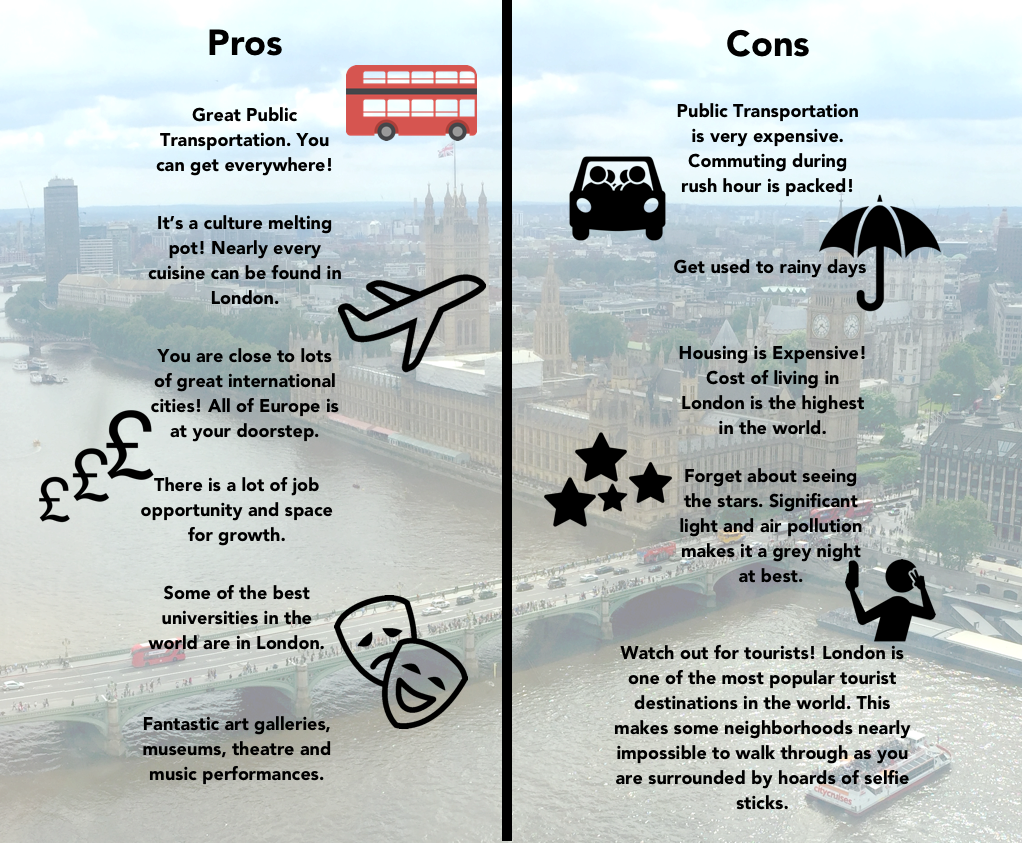
Visa Requirements to Live in the UK:
First you can check if you need a visa – (Click the image to determine if you need a visa)
For additional information on visas in the UK you can visit:
Visa Bureau: http://www.visabureau.com/uk/immigration.aspx
You can also take a look at the types of available work visas as listed on: https://www.gov.uk/browse/visas-immigration/work-visas
After you decide to make the Move to London:
You’ve done it! You are really moving to London. Now there are still a number of logistics to figure out.
What to bring:
If you are going to be renting a place, you do not need to worry about shipping your bed frames and couches. What you should bring is clothing items (though you will probably buy more) and items to help make the place you are renting feel more like home.
If you are buying a home or making a permanent move, you likely want to bring along some larger resources for the home.
Shipping Goods to London
- For heavy and large items try out Parcel Monkey.
- On their website you can get quotes for shipping items between 30 kg and 500 kg.
- You can also get quotes from UK’s mail service: Royal Mail.
- For smaller items it is best to try to bring them with you on the airplane. Sometimes it can be more cost efficient to pay for an economy plus or even business class seat. With these seats you get access to extra luggage space and it could be cheaper than shipping separately.
Bringing a pet from abroad:
To can enter the UK with a pet cat, dog or ferret if:
- It has been microchipped.
- It has a pet passport of third country official veterinary certificate.
- It has been vaccinated against rabies. *some countries of origin also require a blood test.
- Dogs require a tapeworm treatment.
*If you don’t follow these rules your pet could be put in quarantine for up to 4 months.

Don’t make Paws go into quarantine! Read all the requirements.
For a full look at the requirements of traveling with a pet visit: Take Pet Abroad
Finding a Place to Live:
Finding a place to live when you are moving to London can be one of the greatest cause of stress. With 33 boroughs London is a massive space and varies a lot based on neighborhood. Cost of living also varies massively when you move to London and certain neighborhoods are much more expensive than others.
Resource page for finding a room to rent in London.
Deciding the location:
The website Find Properly is a great place to begin a property search. On the site you can get use a property search based on transportation time to work and how much you have to spend.
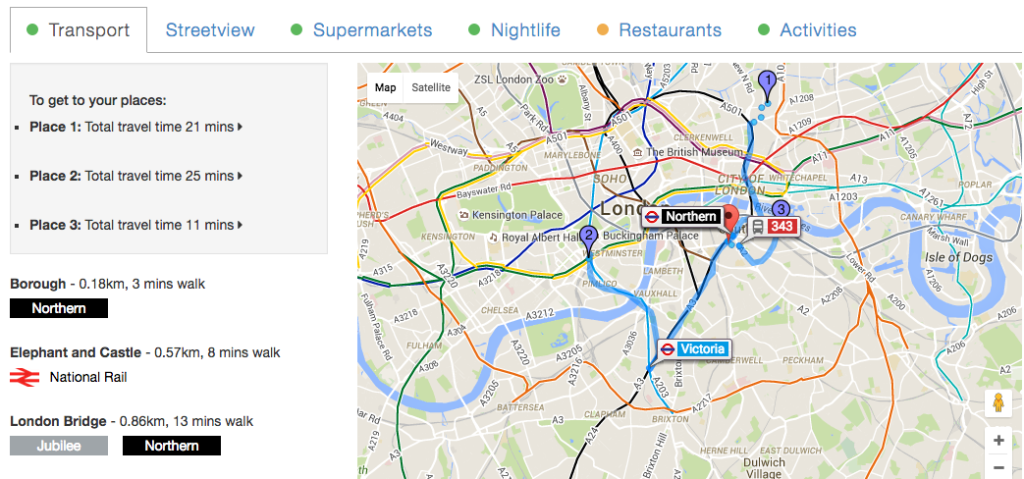
This page offers neighborhood guides for places to live around London.
Where you live when moving to London will be highly dependent on where you are working. There are lots of great neighborhoods of varying costs and access to public transport.
It is best to think about what amenities are most important to you. Some to consider are:
- Proximity to a park
- Access to pubs/restaurant
- Nearest grocery story
- Access to GP/hospital
- Travel time to major airports
- General safety of neighborhood
- Noise level at night
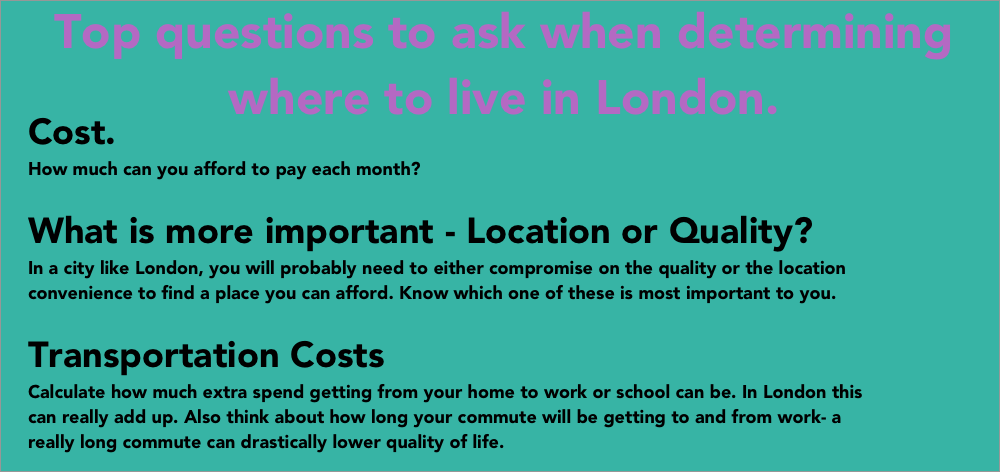
Renting an entire flat or house:
These are the three largest websites for looking for a place to rent when you are moving to London.
Rightmove: http://www.rightmove.co.uk/
Zoopla: http://www.zoopla.co.uk/
Gumtree: https://www.gumtree.com/london
- Gumtree has loads of properties available but is most susceptible to scammers. Beware of ‘too good to be true’ deals.
These sites are the best places for you to start your search. You will be able to see a wide selection of properties and determine about how much it costs to rent in the neighborhoods you are most interested in.
For most properties in London you will be working with Estate Agents not the landlord when you are searching for a property. Be sure to ask the estate agent what their fee is and add that into your budget for the property search.
Rental Hack: If you work with estate agents of the neighborhood you want to live in- they can connect you to homes b4 they are listed online
— acasa (@helloacasa) July 6, 2016
Additional websites to look for property in:
Rental Hack: Newspaper ads & walking in yr ideal location looking @ ‘for rent’ signs can lead 2 the best finds bc landlord is not tech savvy
— acasa (@helloacasa) July 6, 2016
An additional tip, don’t shy away from adverts that are written in ALL CAPS. It could ALSO BE THAT THE LANDLORD IS NOT TECH SAVVY.
Other resources to help you find a place to live:
10 tips for finding houses or flats for rent in London
The Crazy London Housing Market – How the Hell do Millennials Find Houses for Rent
4 expert hacks for finding flats to rent in London
Renting shared accommodation in London:
Finding a property is one thing, but finding the right flatmates is another. Living with someone who has the same values and living habits is equally, if not more, important than the property. The only website we’ve found that can match you with like-minded people is called ideal flatmate. Take their 20-question survey, and they’ll find your perfect flatmate matches.
Sharing a home is extremely common in London. Due to high costs of rent this is a popular way to lower the cost of living for many individuals.
The two most popular pages for finding shared accommodation are:
You can also look to find a room to rent via Facebook groups or smaller flatmate hunting websites.
This page provides a comprehensive list.
Unfortunately what many find is it can be extremely competitive to find a high quality flatshare from these sites. The best rooms will receive 20+ requests in just a few hours. Remember to be courteous and easy to communicate with throughout the process.
Generally, the more personalised your outreach to a flat the better response.
Also remember that you are going to be actually living with these people. This page lists the best questions to ask a potential housemate.
These questions pertain to:
- Cleanliness
- Sleeping & Noise
- Guests
- Work Life
- Money
- Food & Cooking
- Flatmate Expectations
- Furniture
- Pets
- Windows
- Smoking
- Flatmate references
- Length of stay
If you are sharing a home after your move to London, why not try using acasa to manage your shared household finances. One less problem to worry about as you make a new life in London.
What if I want to do my property search before I actually arrive to London?
This is also extremely common and in this case it is best to work directly with an estate agent. Make sure that the estate agents you are working with from abroad is a reputable one. One certification that is helpful to check for is if they are RICS certified.
You also want to make sure that your security deposit is protected.
Temporary Housing before finding a place to Rent:
Planning to spend a few weeks in temporary housing before you officially moving to London can help ease the stress of planning.
If you are transferring from a foreign office, your company will likely offer you a place to stay for the first two weeks before you find a place to rent.
Other low-cost options include:
- Reach out to friends and family about temporarily crashing on their couch.
- Stay at an Airbnb. This could also be a great way to make friends.
- Reach out to CouchSurfers in the city. Also a great way to make friends!
- Couchsurfing tip: If you don’t have any recommendations on Couchsurfing people are often very hesitant to let you stay. Ask another friend or relative to join the site and endorse you. People with recommendations are much more likely to be accepted!
Opening a Bank Account and Managing Money
Sending money from abroad:
TransferWise is the best tool when you are just getting started in the UK to send money from abroad when you are doing smaller amounts. They offer significantly lower fees than traditional money transfer experiences.

If you are transferring a very large sum of money into the UK, it is better to check with banks to make sure you are getting the best right. Money Super Market is a reputable source for learning about financial policies in the UK. This article informs about: How to transfer a large sum of money internationally?
Utilise a currency card:
Transferring money to a currency card when you first arrive can be a great way to save on atm fees or feel you need to rely too heavily on cash.
Revolut Card: You can order this card for free and it will arrive in a few days with a very easy registration process. You are also able to utilise a Revolut card to make purchases anywhere in the world, in over 90 currencies. Fancy a trip to France right after your move to London- you won’t have to worry about transferring pounds to euros.
Opening a Bank Account in the UK:
This can be one of the most stressful elements of moving to London. Many new Londoner’s have struggled with the process.
The major issue is that in order to open a bank account in the UK, you need to show a proof of address. Unfortunately, if you just moved- you might not have this.
Some tricks for providing proof of address right after you move:
- If you applied for your National Insurance Number the letter they send to your house from Jobcentre Plus. This letter will generally arrive within 1 or 2 days of scheduling your interview for your National Insurance Number.
- If you are in shared accommodation, ask for an old utility bill from the flat. Once you have that bill, ask the person whose name is on that bill to write a letter verifying you live in that location.
Once you have a proof of address it is much easier to open a bank account than before.
This page offers additional insight on How to Open a Bank Account in the UK.
How to start investing in the UK?
Want to start putting your salary to good use immediately after moving to London. Start investing!
Even if you only have £100 to spare each month, starting investing early can make a huge impact later on. Some of the best places to start thinking about investments in the UK are:
- Funding Circle: Estimated return of 7.4% per year. Backing British Businesses.
- LendInvest: UK Property investments with net returns from 5%
For crowdfunding:
Additional advice for investing in the UK.
Gaining access to medical care
The United Kingdom provides free healthcare to everyone living in the country through the National Health Service.
The NHS is generally a very reliable service that is internationally renowned. Do beware that at busy times of the day there can be very long wait times though.
If you would like to learn more about the NHS you can click on the image below.
Registering with a GP:
It is best to register with a GP early when you are moving to London. The process is extremely quick and easy but it is best to get it done before you are feeling very sick and desperate for medical help.
You register with the GP that is closer to where you live. This page provides you all the information you need to know to register with a GP.
Dental Care:
Not everyone in the UK is entitled to free dental care. Many employers offer dental insurance as part of their benefits package.
This page helps you determine if you are eligible to free dental care.
If you are not eligible, you can contact dentists located near your home and work. This is a look at the average dental prices in the UK.

Sexual Health Care:
There are a variety of services that offer sexual health care when you are living in the UK. The organisations that provide service are:
- GPs
- Contraception clinics (also known as family planning clinics)
- Sexual health clinics
- Sexually transmitted infection (STI) testing clinics
- Genitourinary medicine (GUM) clinics
- Pharmacies
- Sexual assault referral centres
- Young people’s services
Complete information on the sexual health services offered in the UK.
Getting a Cell Phone:
Getting a cell phone after making the move to London is a relatively simple process. If you already own a phone you just need to pick up a chip from a UK provider and you are good to go.
If you would need to purchase a phone, Carphone Warehouse has some of the best resources in the UK. If you are not paying back a phone, UK data plans tend to start at around £10 per month.
More information on getting a cellphone in the UK.
Working in the UK:
If you do not already have a job- finding a job quickly will likely be your top priority when moving to London.
Apply for a National Insurance Number:
Everyone who is working in the UK needs to apply for a National Insurance Number. This acts like your tax number and must be provided to employers when you are working.
To get a National Insurance Number you must book an appointment to be interviewed at JobCentre Plus. Generally you can get an interview within a few days. After your interview you wait about a month to see if you have qualified to receive a National Insurance Number. This number will be sent to you by post.
You are allowed to start working before you have a National Insurance Number. The application document you receive during your interview can be presented to an employer while you wait for your official number to be issued.
Finding a Job:
There are a number of job sites out there to help you with your job search. Finding a job in London is similar to finding a job in many other major cities. Some general tips:
- Reach out to your personal (or LinkedIn) network to see if anyone you know can offer you an introduction for a job.
- Attend networking events in your industry.
- Cater each application to the exact job you are applying for. No-one likes generic cover letters.
- Utilise a recruiter to help you find a job.
- Be optimistic. Finding a job can take time, remember to keep your head up and you will find something.
More tips for getting a job in London.
Getting around in London:
London has one of the best public transportation systems in the world.
Oyster Card
The first thing to do is get an Oyster Card and top it up with credit. DON’T even leave the airport without getting an Oyster Card. The card has a £5 deposit and within your first journey you will have already saved money. In the future, when you get a UK contactless bank card this will offer you the same rates as an Oyster Card.
Apps to get around
While the Google Map App does work in London, downloading CityMapper will offer you more accurate time and price estimations.
Delays
One thing to note about London transport, there are often delays. The upside is it is very easy to check train, tube and bus delays online so hopefully you don’t get stuck waiting at the station for ages. Transportation for London provides an up to date service of delays on transportation Lines in real time.
Cycling in London
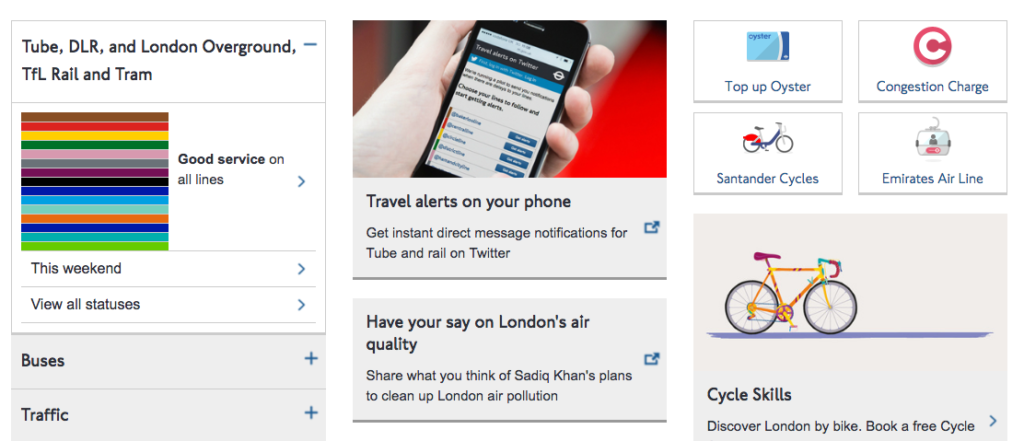 Santander Cycles are one of the most affordable form of travel around London. You can rent a cycle for £2 for 24 hours. (That’s a lot cheaper than rush hour tube!)
Santander Cycles are one of the most affordable form of travel around London. You can rent a cycle for £2 for 24 hours. (That’s a lot cheaper than rush hour tube!)
With the bikes you can use them for 30 minutes at the time before dropping them off at the next docking station. If you are comfortable on a bike, this is often the easiest form of travel for short distances. There are docking station all over central London. Downloading the Santander Bike app will show you exactly where these stations are.
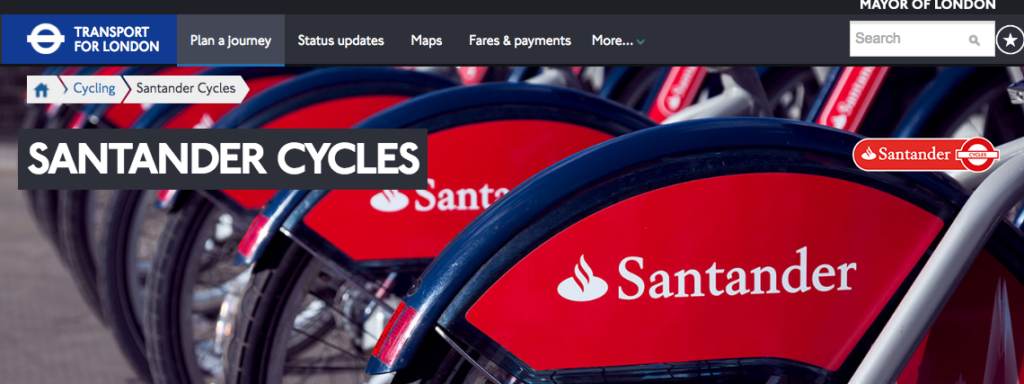
Cycling Safety
Do bear in mind cycling safety when cycling around London.
Some safety tips provided by transport for London include:
- Always pay attention – do not wear head/earphones or use a mobile phone while cycling
- Stop at red lights
- Always signal clearly
- Stay central on narrow roads and avoid parked cars and cycling on pavements
- Stay back from HGVs – lorries and other large vehicles might not be able to see you clearly, so stay well back behind them
- Use night lights after dark – white at the front and red at the rear. You may be fined £50 if you don’t have them
- Consider wearing a helmet
How to get discounts on travel
Purchase a railcard. The types of railcards are:
- 16-25 year Railcard
- Two Together Railcard
- Family & Friends Railcard
- Senior Railcard
- Disabled Persons Railcard
These railcards vary based on which card you apply for.
*Extra Tip: You can buy the 16-25 year old railcard for three years at a time. When you are 25 year can purchase this railcard for the next three years for extra savings!
If you are a student there are also a myriad of ways you can save money on transport if you are living in London. Check out the Student Guide to Travel to learn more.
Building a Social Life:
Building a social life can be one of the hardest things to do when you are new to London. A few tricks will help put you in a strong position when making friends after moving to London.
- Reach out to your friends for introduction to their friends living in London.
- Put yourself out there.
- Attend meetups that you are interested in
- Chat to the person next to you on public transport (if they look up to it. People who live in London generally don’t like tube chatting)
- Join a sports team
- Volunteer around the city
- Join an organization
This page offers a full set of resources on building a social life in London.
Bloggers with Great Advice about Moving to London:

The Broke in London blog is a great place to get information if you are moving to London and on a tight budget. Manolis Zografakis started the blog when after university he found himself broke and with nowhere to live. Manolis now leads a team of 7 in sharing tips for living in London and not breaking the bank account.

London New Girl is a blog created by Kamila Zawadzka who came moved to London from Australia in 2012. In her blog she offers a variety of tips to help people moving to London. She also showcase activities and important events happening around the city. Other topics she writes on include travel around Europe and Health & Fitness. This blog is exceptionally relevant for Australians moving to London.
Moving to London? Ultimate 2016 Living & Working Guide
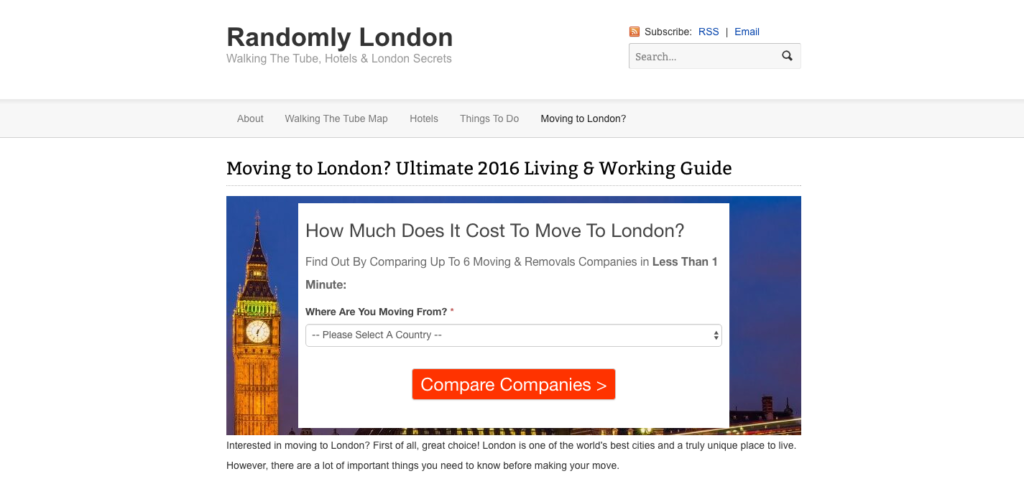
Ian Wright writes Randomly London sharing his experiences living in the city since moving to London from Canada with his wife. Ian has created an extensive moving to london guide with information on visas, where to live, tips for renting and more. Ian’s blog also shares his story of walking all of London’s tube map.
London Lotta How to Move to London

This blog is written by Charlotta Buxton. Originally Finish, Charlotta moved to London in 2009 and now lives in North London with her husband. The London Lotta offers both a guide to London and how to move to London guide.
—
Moving to London can be hard but after a few months you will likely feel like you never want to leave.
London is a vibrant city with countless interesting pockets to explore and interesting people to meet. Due to a high housing demand and an expensive cost of living in London, it is extremely common to share a home. Don’t expect to find a 1 bedroom in central London for less than £1400 a month.
acasa is a free tool to help you track and split your shared expenses with flatmates or a partner. We think it can really make a positive impact in your life when moving to London.
You can also check out all the information featured in this guide by checking out our directory of resources for anyone New to London.
Have more ideas for resources to include in this guide to moving to London? Let us know if the comments! Also let us know if you would like us to add additional categories to help moving to London.
Written by: Julianne Sloane – Moved to London in December 2015.


